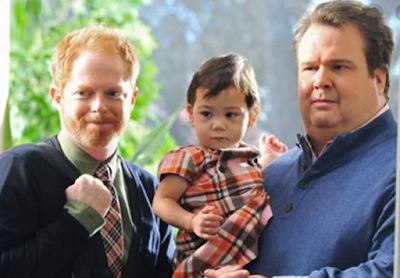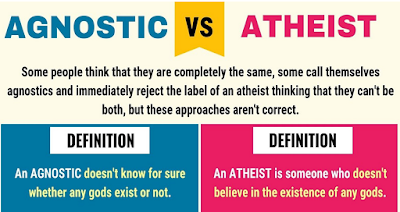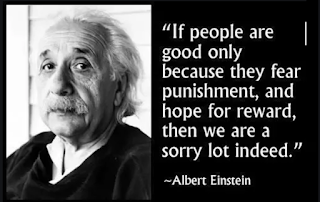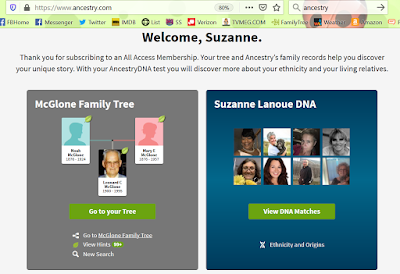Assignment #3: Depiction of Women and Minorities
Worldwide Persecution of Atheists in Media and Elsewhere
Throughout history, many people have been persecuted for their religious beliefs. They're persecuted because their beliefs are different from those in the majority, or those in power, or they're persecuted because they don't believe the same religion as their persecutors, or because their persecutors want to use them as a scapegoat for their problems (such as Jews in Nazi Germany). There isn't any religious group that hasn't faced persecution at some point throughout history. One group that is also persecuted is those who have no religious beliefs: atheists (some of which prefer the term agnostics).
Most people are taught about religion by their parents, or they're brought into a particular religion by their family, and they don't ever stray from that. Parents have a very strong influence on their children, as I learned way back in my psychology and child education classes 30 years ago. For the first few years of each child's life, they spend most of their time with their parents and siblings, and they learn everything from watching and listening to them. When they go to school, they spend more time with their teachers than anyone else. Parents have a huge influence over their children's habits, knowledge, beliefs and how they interpret the world around them. When a parent tells them about God or other beliefs, and also takes them to church, and to church-related activities, that influences the child into sharing those beliefs. Relatively few people decide later to change those beliefs or leave their church because to do so would make them (or their parents) feel like they're rejecting them and their beliefs (although, this seems to be changing). This would put a huge strain on the family.
Even as adults, we try to please our parents and get along with them. For some families, having a child that has very different beliefs, even as an adult, causes terrible heartbreak. Religion is important to many people, and it effects how they feel about morality, behavior, community, the afterlife and many other things. When people choose a different religion, or reject religion entirely, this can cause a lot of problems in families. Many people pretend to still believe, even though they've lost their faith. Many still go to church or engage in church-related activities because that is part of their community. The ones that have trouble with pretending or don't want to be in that community, often move far away, which breaks them from their family as well as their religion.
If a person is not brought up in any religion, then it still depends on how their parents taught them about it as to how they will believe later on in life. They may still share their parents' beliefs, or they may be "spiritual" without any particular religious practice, or they may be atheist. Some parents let their children decide for themselves whether they want to believe or not, and whether they want to go to church or not.
There are different types of atheists because people have many different beliefs, even in their non-belief. Some are not willing to be called "atheist" and say they're just not sure, or they call themselves "agnostics." Some people go through their lives with different religious experiences, trying to find meaning in different churches or faiths. Some atheists, who live in a more secular culture, don't really give religion much thought at all beyond the fact that they don't believe in it themselves. It's just who they are, like having brown hair. Because of the differences, polls about atheists are not entirely accurate. The type of wording used in polls makes them vary wildly. It appears that about 61% of China is atheist, and 20% of Europe. In the U.S., polls range from 21% to 31%.
Although there are more atheists in the world than ever before, they are often shown in a negative light. Many people think that being an atheist means that a person has no morals. However, most people are taught the difference between right and wrong growing up, whether they're taught religion or not. Most children learn early on that being "bad" gets you into trouble and makes people angry at you, and that being "good" gets you rewards and better treatment. Many atheists consider themselves humanist, meaning that they value human beings, rational thought and empirism, rather than superstition or dogma. Indeed, the word "atheist" comes from the 16th century, otherwise known as the Age of Enlightenment.
Our American culture is generally seen as "Judeo-Christian," meaning that most people here have a shared common background from Jewish and Christian religions. There's a general assumption that when you meet a person, they have some sort of religious belief. I've lived all over the U.S. In larger cities, especially in California, Hawaii, New York and Chicago, people keep that assumption to themselves. They don't necessarily ask about the other person's religious beliefs. It's considered rude to ask, much like it would be rude to bring up sex or politics with a stranger. These can be sensitive subjects, and cities tend to have all different types of people, from all religions, so it's a good idea not to discuss it in an informal way. In Texas and the South, most people are Christian, so they assume everyone is. They don't really think about anyone not being Christian because at least 76% of the people they know are. Church is such a big part of their lives that it's not considered rude to talk about it. If you're in the North, you might get asked, if it doesn't seem too rude, "Do you go to church?", "Are you religious?" or "What religion are you?" In the South, you're asked, "Which church do you go to?" and they assume it's a church, not a mosque or synagogue. They might also ask, "What is your church home?" Even in places like New York or Hawaii, though, you can find a lot of people of different religions, and yet they still don't always react well to atheists. If someone lets it be known that he/she is an atheist, then the others may try to convert the atheist to their religion, or worse. It may affect the person's job opportunities.
We haven't yet had a president that has admitted to being an atheist or even agnostic, with good reason. There are few politicians that will admit it at any level. There is a lot of prejudice in our country against atheists, just like there is against gays and women, as there used to be against Catholics and divorced people. In most Western countries, atheists are protected by law, so they can't be discriminated against in any open or obvious ways. A study showed that people in the US distrust atheists as much as rapists. Another showed that people who openly identify as atheist are more likely to have trouble finding a job. Many atheists feel that they face the same type of discrimination that gays or women face in terms of legal, social, personal and professional contexts. Many states have laws that prevent atheists from holding office, but they're not enforceable because those laws are prohibited by the First Amendment.
In other countries, an atheist can be discriminated against, fined, jailed or even killed, especially in Muslim countries. Even in some countries that are secular, such as India, atheists can be jailed. Most European countries have elected high officials who are admitted atheists. There are still some religious influences, however, particularly in countries like Ireland that are predominantly Christian. Studies in Brazil have shown that atheists are often hated or mistrusted. A survey ( that included people in many different countries) showed that atheists are still mistrusted and thought to be immoral, even in Europe.
For atheists, the worst countries you could live in would be Muslim-majority countries. They discriminate against atheists, or jail them, or even kill them. In fact, in 13 of the Muslim countries, just changing to another religion, or to become an atheist, is called "apostasy" and is punishable by death. A report in 2018 showed the best and worst countries for atheism in terms of discrimination and violence. Saudi Arabia was ranked the worst among 160 countries. Of course, conservative Muslim countries don't treat LGBTQ or women all that well, either.
India is not a Muslim country, but atheists there have been persecuted or assassinated. Some have been shunned by their families. Atheism is not recognized on official government forms or on the census. They can't publicly discuss atheism or they'd risk getting arrested from "blasphemy laws."
In the UK, atheism is no big deal. The atheists there are very outspoken. Most people don't really think about religion very much, even though they have a state religion. However, the BBC has been accused of being too religious and not letting non-religious people have a voice.
Most people in Scotland are not very religious, either. Ireland is a very Catholic country, but over 6% of its people are not religious. You can still be fired there from some jobs if you're gay or atheist. There was an award-winning Irish movie about a little atheist girl that focused on how atheists are treated there. Italy is another Catholic country. They also have some laws against "blasphemy" and criticism against religion. In France, 40% of the country is not religious.
China is quite repressive in many ways, but being a Communist country, there is no official religion, so they don't have any religion-related laws. In fact, they're the least religious country in the world, followed by Sweden and the Czech Republic. Still, there are many countries that have "blasphemy laws" or have discriminated against atheists, including Germany and Poland. Some countries, like Greece and New Zealand, just recently overturned these type of laws. Here's a map of which countries have the most and least discrimination.
Mexico has historically been a Catholic country, but they've had separation of church and state since their revolution in the 19th century. Still, only about 10% are non-religious. I couldn't find any evidence of atheists being unfairly treated in Mexico. However, the government there is corrupt, so it wouldn't surprise me if anyone in power used atheism as an excuse to mistreat someone.
The treatment of atheists in literature, movies and TV probably corresponds with the way they're treated in real life. That is, in most places, atheists will sometimes appear as a character, with little fanfare one way or the other. In more repressive countries, you're unlikely to find them at all, or you'll only find them treated badly.
Here are a few examples. This man was kicked off Egyptian TV for talking about atheism, even though they specifically invited him for that reason. He had to flee after being harassed by the police. A Nigerian man was put in a mental hospital for being atheist; his father blamed TV for influencing him.
There are some lists of atheist characters in TV, comics, movie and video games, but they're mostly from the US. Here's another list. I couldn't find any list of atheist characters in other countries. There's also an Atheist TV network here. However, atheism is not welcomed in the US as well as it is in Europe and some other countries.
Throughout history, many people have been persecuted for their religious beliefs. They're persecuted because their beliefs are different from those in the majority, or those in power, or they're persecuted because they don't believe the same religion as their persecutors, or because their persecutors want to use them as a scapegoat for their problems (such as Jews in Nazi Germany). There isn't any religious group that hasn't faced persecution at some point throughout history. One group that is also persecuted is those who have no religious beliefs: atheists (some of which prefer the term agnostics).
Even as adults, we try to please our parents and get along with them. For some families, having a child that has very different beliefs, even as an adult, causes terrible heartbreak. Religion is important to many people, and it effects how they feel about morality, behavior, community, the afterlife and many other things. When people choose a different religion, or reject religion entirely, this can cause a lot of problems in families. Many people pretend to still believe, even though they've lost their faith. Many still go to church or engage in church-related activities because that is part of their community. The ones that have trouble with pretending or don't want to be in that community, often move far away, which breaks them from their family as well as their religion.
If a person is not brought up in any religion, then it still depends on how their parents taught them about it as to how they will believe later on in life. They may still share their parents' beliefs, or they may be "spiritual" without any particular religious practice, or they may be atheist. Some parents let their children decide for themselves whether they want to believe or not, and whether they want to go to church or not.
There are different types of atheists because people have many different beliefs, even in their non-belief. Some are not willing to be called "atheist" and say they're just not sure, or they call themselves "agnostics." Some people go through their lives with different religious experiences, trying to find meaning in different churches or faiths. Some atheists, who live in a more secular culture, don't really give religion much thought at all beyond the fact that they don't believe in it themselves. It's just who they are, like having brown hair. Because of the differences, polls about atheists are not entirely accurate. The type of wording used in polls makes them vary wildly. It appears that about 61% of China is atheist, and 20% of Europe. In the U.S., polls range from 21% to 31%.
Our American culture is generally seen as "Judeo-Christian," meaning that most people here have a shared common background from Jewish and Christian religions. There's a general assumption that when you meet a person, they have some sort of religious belief. I've lived all over the U.S. In larger cities, especially in California, Hawaii, New York and Chicago, people keep that assumption to themselves. They don't necessarily ask about the other person's religious beliefs. It's considered rude to ask, much like it would be rude to bring up sex or politics with a stranger. These can be sensitive subjects, and cities tend to have all different types of people, from all religions, so it's a good idea not to discuss it in an informal way. In Texas and the South, most people are Christian, so they assume everyone is. They don't really think about anyone not being Christian because at least 76% of the people they know are. Church is such a big part of their lives that it's not considered rude to talk about it. If you're in the North, you might get asked, if it doesn't seem too rude, "Do you go to church?", "Are you religious?" or "What religion are you?" In the South, you're asked, "Which church do you go to?" and they assume it's a church, not a mosque or synagogue. They might also ask, "What is your church home?" Even in places like New York or Hawaii, though, you can find a lot of people of different religions, and yet they still don't always react well to atheists. If someone lets it be known that he/she is an atheist, then the others may try to convert the atheist to their religion, or worse. It may affect the person's job opportunities.
We haven't yet had a president that has admitted to being an atheist or even agnostic, with good reason. There are few politicians that will admit it at any level. There is a lot of prejudice in our country against atheists, just like there is against gays and women, as there used to be against Catholics and divorced people. In most Western countries, atheists are protected by law, so they can't be discriminated against in any open or obvious ways. A study showed that people in the US distrust atheists as much as rapists. Another showed that people who openly identify as atheist are more likely to have trouble finding a job. Many atheists feel that they face the same type of discrimination that gays or women face in terms of legal, social, personal and professional contexts. Many states have laws that prevent atheists from holding office, but they're not enforceable because those laws are prohibited by the First Amendment.
In other countries, an atheist can be discriminated against, fined, jailed or even killed, especially in Muslim countries. Even in some countries that are secular, such as India, atheists can be jailed. Most European countries have elected high officials who are admitted atheists. There are still some religious influences, however, particularly in countries like Ireland that are predominantly Christian. Studies in Brazil have shown that atheists are often hated or mistrusted. A survey ( that included people in many different countries) showed that atheists are still mistrusted and thought to be immoral, even in Europe.
For atheists, the worst countries you could live in would be Muslim-majority countries. They discriminate against atheists, or jail them, or even kill them. In fact, in 13 of the Muslim countries, just changing to another religion, or to become an atheist, is called "apostasy" and is punishable by death. A report in 2018 showed the best and worst countries for atheism in terms of discrimination and violence. Saudi Arabia was ranked the worst among 160 countries. Of course, conservative Muslim countries don't treat LGBTQ or women all that well, either.
India is not a Muslim country, but atheists there have been persecuted or assassinated. Some have been shunned by their families. Atheism is not recognized on official government forms or on the census. They can't publicly discuss atheism or they'd risk getting arrested from "blasphemy laws."
In the UK, atheism is no big deal. The atheists there are very outspoken. Most people don't really think about religion very much, even though they have a state religion. However, the BBC has been accused of being too religious and not letting non-religious people have a voice.
Most people in Scotland are not very religious, either. Ireland is a very Catholic country, but over 6% of its people are not religious. You can still be fired there from some jobs if you're gay or atheist. There was an award-winning Irish movie about a little atheist girl that focused on how atheists are treated there. Italy is another Catholic country. They also have some laws against "blasphemy" and criticism against religion. In France, 40% of the country is not religious.
China is quite repressive in many ways, but being a Communist country, there is no official religion, so they don't have any religion-related laws. In fact, they're the least religious country in the world, followed by Sweden and the Czech Republic. Still, there are many countries that have "blasphemy laws" or have discriminated against atheists, including Germany and Poland. Some countries, like Greece and New Zealand, just recently overturned these type of laws. Here's a map of which countries have the most and least discrimination.
Mexico has historically been a Catholic country, but they've had separation of church and state since their revolution in the 19th century. Still, only about 10% are non-religious. I couldn't find any evidence of atheists being unfairly treated in Mexico. However, the government there is corrupt, so it wouldn't surprise me if anyone in power used atheism as an excuse to mistreat someone.
The treatment of atheists in literature, movies and TV probably corresponds with the way they're treated in real life. That is, in most places, atheists will sometimes appear as a character, with little fanfare one way or the other. In more repressive countries, you're unlikely to find them at all, or you'll only find them treated badly.
Here are a few examples. This man was kicked off Egyptian TV for talking about atheism, even though they specifically invited him for that reason. He had to flee after being harassed by the police. A Nigerian man was put in a mental hospital for being atheist; his father blamed TV for influencing him.
There are some lists of atheist characters in TV, comics, movie and video games, but they're mostly from the US. Here's another list. I couldn't find any list of atheist characters in other countries. There's also an Atheist TV network here. However, atheism is not welcomed in the US as well as it is in Europe and some other countries.




















Comments
Post a Comment